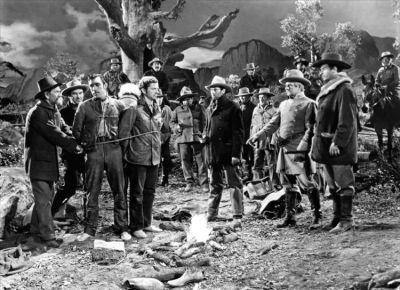
THE OX-BOW INCIDENT
(Alba fatale, 1943) R.: William Wellman. D.: 75'. V. inglese
T. it.: Alba fatale Sog.: dal romanzo omonimo di Walter Van Tilburg Clark. Scen.: Lamar Trotti. F.: Arthur C. Miller. M.: Allen McNeil. Scgf.: James Basevi, Richard Day. Mus.: Cyril J. Mockridge. Int.: Henry Fonda (Gil Carter), Dana Andrews (Donald Martin), Henry 'Harry' Morgan (Art Croft), Anthony Quinn (Francisco Morez), Harry Davenport (Arthur Davies), Francis Ford (Alva 'Dad' Hardwick), Jane Darwell (Jenny 'Ma' Grier), William Eythe (Gerald Tetley), Frank Conroy (maggiore Tetley). Prod.: Lamar Trotti per Twentieth Century-Fox Film Corp .
35mm. D.: 75'. Versione inglese con sottotitoli francesi / English version with French subtitles
Da: CNC - Archives Françaises du Film per concessione di Twentieth Century Fox
Wellman acquistò i diritti di The Ox-Bow Incident da Harold Hurley, un produttore di scarso successo della Paramount specializzato in film di serie B. Hurley, secondo Wellman, sognava di ingaggiare Mae West per farla "cantare per questi cowboy stanchi". Ricevuto il via libera, Wellman diede un taglio diverso al film e chiamò Henry Fonda, del quale dirà poi: "Fonda è ovviamente un bravo attore, ma gli manca quel qualcosa che è l'essenza del grande divo. Quel qualcosa io lo chiamo 'personalità cinematografica'". Ma è qui che sta la chiave di The Ox-Bow Incident, come ha precisato Wellman nella sua autobiografia intitolata A Short Time for Insanity: "Hank [Henry] Fonda, forse il miglior attore che mi sia capitato di dirigere e sicuramente il più professionale. Sei settimane prima che iniziassero le riprese di The Ox-Bow Incident si procurò un costume, lo sottopose alla mia approvazione e da quel momento ci visse e probabilmente ci dormì dentro. Gli stivali, i Levi's, il cappello e le bandane divennero parte di Gil Carter (il personaggio che interpretava) e non di Hank Fonda, perché Hank era diventato Gil. Si comportava come Gil, parlava come lui, sembrava lui, e quando fummo pronti a girare aveva anche il suo odore, e la sua interpretazione fu perfetta". The Ox-Bow Incident non è la storia di un uomo ma la storia di una situazione. Fonda si mimetizza e si apposta sullo sfondo, osservando il vero protagonista del film: il progresso. Wellman guardò al progresso, con sentimenti opposti, in un altro film: Buffalo Bill, pensato per il divo Joel McCrea e imposto a Wellman da Zanuck in cambio del via libera per Ox-Bow. Con Buffalo Bill, Wellman accetta la sfida e con crudo disincanto documenta la rovina e lo sfruttamento della frontiera, le conseguenze della legge e dell'ordine così disperatamente perseguiti dalle vittime di Ox-Bow. Film ciclico, nella trama e nei movimenti di macchina, The Ox-Bow Incident di Wellman si apre e si chiude con l'immagine di un vecchio cane che attraversa la strada. "Oh, quel cane. Era una vecchia femmina con enormi mammelle penzolanti. La amavo. L'ho usata come cornice per il film; lo apriva e lo chiudeva. Forse sono una specie di artista, chi lo sa. Non so disegnare. Faccio solo film".
Gina Telaroli
Wellman bought the rights for The Ox-Bow Incident from Harold Hurley, a not-successful-enough B-movie producer at Paramount, who, according to Wellman, dreamed of casting Mae West in order to have her "sing some songs to these tired cowboys". Once given the green light, Wellman took the project in a different direction and cast Henry Fonda, of whom Wellman said, "Fonda, of course, is a fine actor, but he lacks that one something that makes a great star. I call it 'Motion Picture Personality'". But herein lies the key to The Ox-Bow Incident, as Wellman detailed in his autobiography A Short Time for Insanity: "Hank Fonda, perhaps the best actor I have ever directed, certainly the most dedicated. Six weeks before we started The Ox-Bow Incident, he wardrobed himself, had me okay it, and then lived and probably slept in it. The boots, the Levi's, the hat, the short, the bandanas, became a part of Gil Carter (the character he portrayed), not Hank Fonda because Hank had become Gil. He looked it, talked it, felt it, and by the time we were ready to shoot the picture, smelled it, and his performance was perfection". What we find in The Ox-Bow Incident is not a story of a man but the story of a situation. Fonda blends in and lurks in the background, observing the movie's real protagonist: progress. Wellman also looked at progress, in a contrasting vein, in another picture he would make: the Joel McCrea vehicle Buffalo Bill, which Zanuck demanded Wellman make as a precondition for green-lighting Ox-Bow. With Buffalo Bill, Wellman flips the coin and very cynically documents the demise and capitalization of the frontier, the after-effect of the governmental law and order so desperately sought after in Ox-Bow. A cyclical film, in story and in camera movement, Wellman's The Ox-Bow Incident opens and closes with an image of an old dog rummaging around on the street, of which Wellman said, "Oh, that dog. She was an old female with enormous tits that hung way down; I loved her. I used that as a frame for the picture; it started it and ended it. Maybe I'm an artist in some sense, I don't know. I can't draw. I just make pictures".
Gina Telaroli

Tariffe:
Aria condizionata
Info: 051224605











